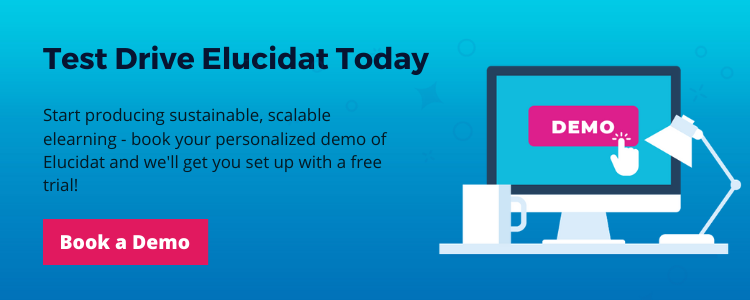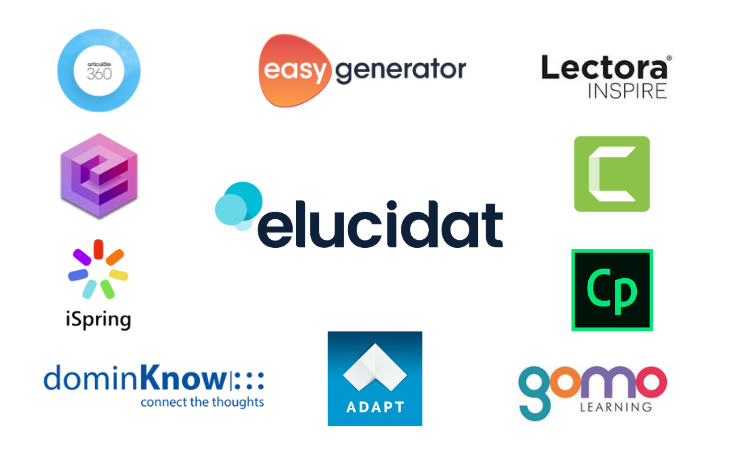5 reasons you shouldn’t just rely on your LMS authoring functionality
5 minute read
If your business is going to develop the skills it needs to survive and thrive during another period of disruption, the right L&D tools are critical. Faced with budget cuts, reducing your learning technology costs may seem like a good idea. But could limiting your tools also limit your impact? Find out why using a Learning Management System (LMS) alone won’t create the business results you need.

LMS tools vs standalone authoring tools
An LMS and an authoring tool are designed to play different but essential roles. An authoring tool enables you to create interactive and engaging digital learning. The LMS allows you to host, deliver and track this elearning, alongside other learning experiences.
There can be a bit of crossover between the two tools. Some LMSs offer basic content creation, while some authoring tools have options to publish and host outside the LMS. However, if you want to maximize their impact, you need to combine these two pieces of tech.
Want to explore these tools in more detail? Find out what’s on the market in our full reviews of SCORM compliant LMSs, LMS platforms, LMS alternatives and authoring tools.
5 reasons you shouldn’t just rely on your LMS authoring functionality
If your LMS has authoring capabilities, it may seem like a cost-effective choice to use this functionality. But before you commit to relying solely on your LMS authoring tool, you need to consider some of the limitations of this approach.
Here are five key reasons that you should consider an authoring tool alongside your LMS:
1. Improving content quality
Even the best LMS needs engaging learning content if it’s going to be effective. Although an LMS may have some authoring capability, it’s often quite basic – limited to text, images and simple questions. This can create uninspiring learning experiences.
As Brandon Hall Group’s Principal Analyst, Michael Rochelle highlighted: great content is the “lynchpin to a good learner experience.”
When we surveyed people to uncover the secrets of corporate training success, the majority of learners highlighted the desire for more personalized and interactive content. If your learning isn’t relevant and engaging, you won’t hold your learner’s attention. Whether it’s decreasing productivity, customer issues or drops in sales, without effective training your employees’ performance suffers. Ultimately, it’s well-designed, personalized learning content that changes behavior and impacts performance. By using a tool that’s dedicated to authoring, you can produce quality digital learning that’s truly tailored to your learners. Not content for content’s sake.
2. Evolving functionality
Authoring will only be a small part of any LMS platform. The focus of investment for the LMS provider will always be on developing the central LMS functionality. And this means that the limited authoring capabilities the platform offers isn’t going to change any time soon.
Since the term ‘elearning’ was coined in 1999, authoring technology has rapidly changed – from the rise and demise of Flash to the reign of HTML and responsive design. With a tool dedicated to creating elearning, you can be confident that your chosen authoring tool’s team are fully focused on developing new functionality and improving the authoring experience.
For example, at Elucidat, we have a research-led roadmap shaped by thousands of active users. Learning Consultants work directly with L&D teams to improve their output and feed this experience, along with the latest instructional design approaches, into our tool development. In the last 12 months alone, enhancements have been made throughout the authoring process, including content creation, collaboration and reviews as well as project releases.
Find out more in our Product Roundup.
3. Staying in control
Technology moves fast. The L&D tools that work for you now may not be the ones you need in the future.
If you ever decide to move to a different LMS vendor and you’ve used it to create content, you may lose access to this digital learning. Whereas, if you’ve created content with an authoring tool, you can move this content to any new LMS you choose.
4. Collaborative working
In an LMS, user permissions tend to be limited to the admin role. Opening up authoring outside your team can be risky. If you want someone to create or edit learning content, you often have to give them access to everything. Whether it’s altered content or deleted courses, this could lead to serious issues. Your LMS will often contain sensitive employee data, so it may not be feasible to enable access to others to produce learning content.
Authoring tools have more granular user permissions. This means you can maintain control while opening up collaborative content creation to anyone across your organization.
5. Scaling up production
Without the ability to open up LMS authoring across your organization, it can be difficult to respond to training needs at scale. If your team doesn’t have the capacity, you may even need to outsource content creation to an elearning agency. This will reduce any cost savings you’ve achieved by not using an authoring tool.
From content creation to localization, an authoring tool allows you to optimize the development process while maintaining quality.
In summary
An LMS is essential for rolling out and managing learning and development at your organization. If your LMS offers authoring functionality, you may want to make use of it for basic needs. But remember that even the best LMS won’t be as effective as specific, dedicated learning content created in an authoring platform, especially if it’s part of a business training platform. Such platforms often enable easy personalization, offer simple but powerful templates, and even provide guidance for novices on how to create impactful learning experiences.
Top authoring tools are packed with the specific functionality you need to produce truly engaging learning experiences. Plus they produce content that can be easily updated and re-released, by anyone, to any LMS you use. They also come with the capabilities that allow you to manage high-scale content production – bringing together features like granular user permissions, collaborative workflows, built-in review systems, translation options, manager dashboards and more. It’s only by using an LMS and authoring tool together that you’ll see real business impact.
Want to see the benefits of an authoring tool for yourself? Book a demo of Elucidat to get started with a free trial.




